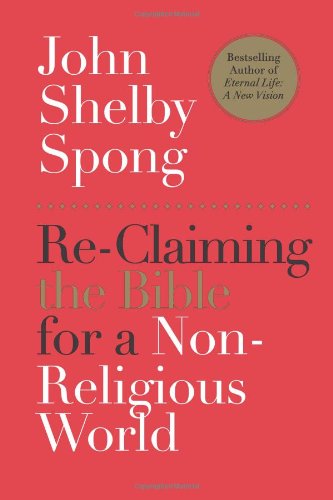Book review: Re-Claiming the Bible for a Non-Religious World
by John Shelby Spong
★★★★★
Could this be Spong’s best yet? Perhaps not, his books are all so powerful, but it’s definitely my new favorite. I’ve actually been looking for precisely this sort of book, so I was really excited to find it—authored by one of my favorite writers, no less!
Spong goes book-by-book in pretty much chronological order through the Bible, explaining scholars’ best guesses at each book’s origin (place, time, authorship) and the historical atmosphere out of which they were written. The idea for this collection sprang from a series of lectures Spong was invited to give, beginning in the summer of 2006, about how various Biblical books came to be written and regarded as scripture. Much of the information here was known to me already, but there was a host of new insights as well. I’ve got yellow highlighter marks all over the book! Here are some of the more interesting discussions you’ll find:
[1] The formation of the Torah, the first five books of the Bible. You’ll learn more about the Documentary Hypothesis, and how scholars believe these five books came together, from the four primary sources. Not the most complete explanation, but surely the easiest to understand I’ve ever read.
[2] The “prophetic principle” (you’ll find out you had no idea what a “prophet” is) and the historic background behind the three “books” of Isaiah. Scholars are coming to the conclusion that Isaiah had not just two authors, but at least three.
[3] The “protest” literature within the Bible, and what stimulated its writing.
[4] The “national mythmakers” who preserved Israel’s history.
[5] The evolution of the Apostle Paul’s beliefs, and how he grew over time from a fiery, apocalyptic preacher into a mellow, thoughtful philosopher.
Of course, you’ll read about the Gospel story, the pastoral influence, the Johannine corpus, it’s all there and it’s all very readable. Highly recommended!












 354 Circles
354 Circles
 603 Goodreads Friends & Fans
603 Goodreads Friends & Fans

 Hello! I'm an author, historical Jesus scholar, book reviewer, and liberal Christian, which means I appreciate and attempt to exercise the humanitarian teachings of Jesus without getting hung up on any particular supernatural or religious beliefs.
The Bible is a magnificent book that has inspired and spiritually fed generations for thousands of years, and each new century seems to bring a deeper understanding of life’s purpose. This is true of not only Christianity; through the years, our age-old religions are slowly transforming from superstitious rituals into humanitarian philosophies. In short, we are growing up, and I am thrilled to be riding the wave.
I avidly read all thought-provoking religion titles. New authors: I'd love to read and review your book!
Hello! I'm an author, historical Jesus scholar, book reviewer, and liberal Christian, which means I appreciate and attempt to exercise the humanitarian teachings of Jesus without getting hung up on any particular supernatural or religious beliefs.
The Bible is a magnificent book that has inspired and spiritually fed generations for thousands of years, and each new century seems to bring a deeper understanding of life’s purpose. This is true of not only Christianity; through the years, our age-old religions are slowly transforming from superstitious rituals into humanitarian philosophies. In short, we are growing up, and I am thrilled to be riding the wave.
I avidly read all thought-provoking religion titles. New authors: I'd love to read and review your book!
 Hi! While Lee writes the articles and reviews the books, I edit, organize, and maintain the blog. The views expressed here are Lee's but I'm his biggest supporter! :-)
Hi! While Lee writes the articles and reviews the books, I edit, organize, and maintain the blog. The views expressed here are Lee's but I'm his biggest supporter! :-)
Connect With Me!